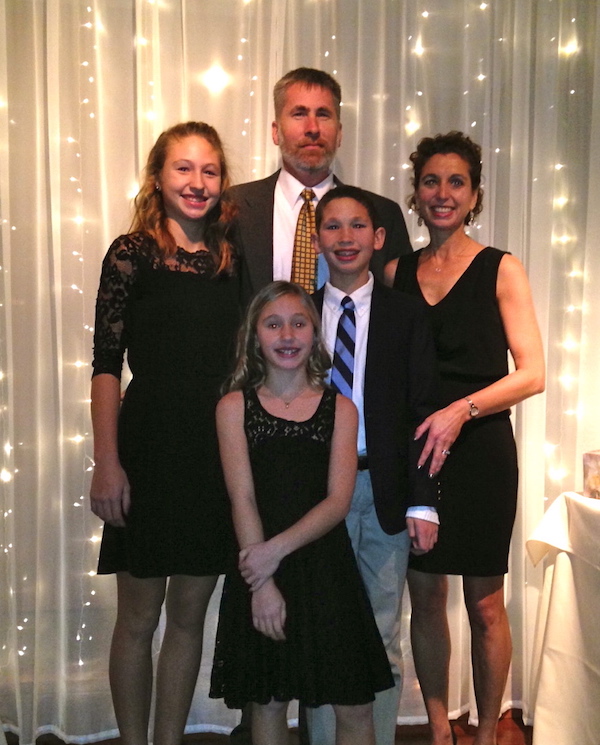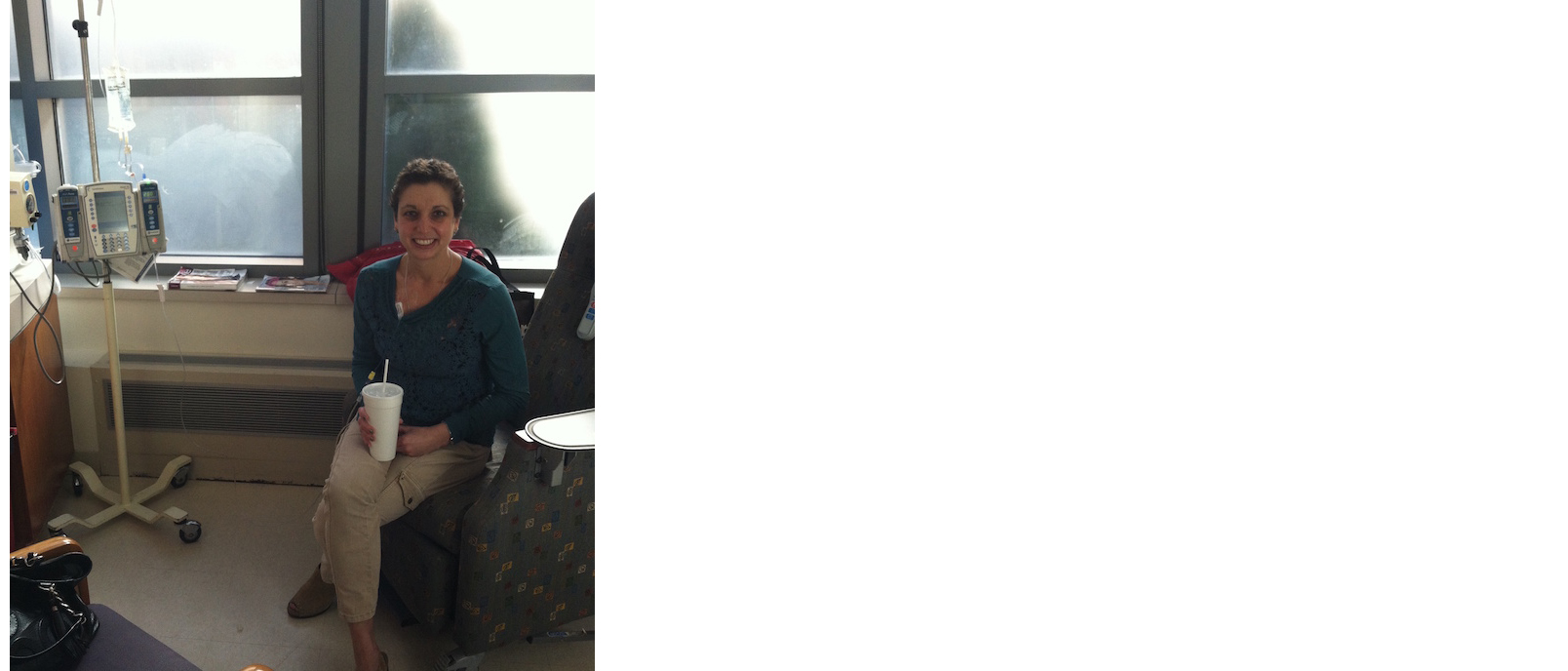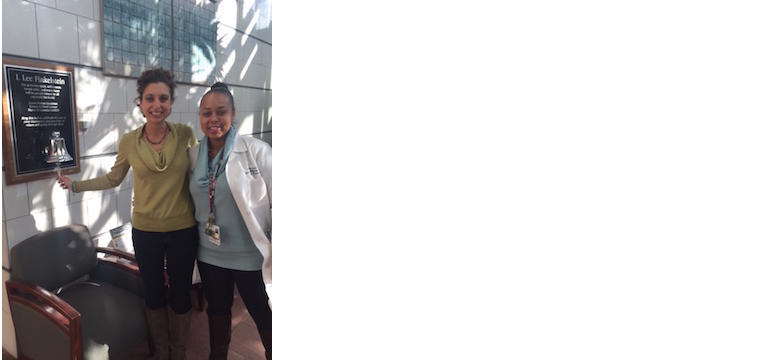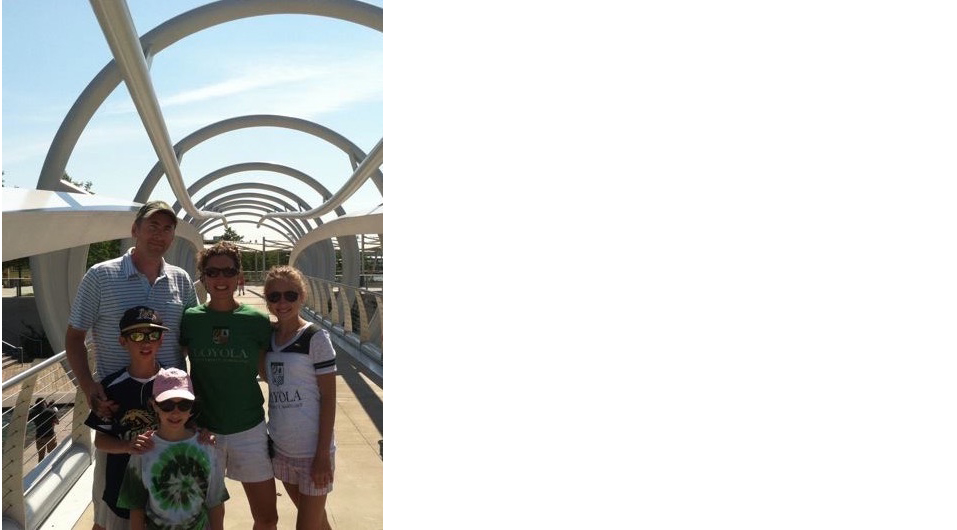By Guest Blogger Dana Deighton
Though my 25 years of professional experiences are mostly rooted in marketing, the last 15 years or so of my personal life have been defined in large part by cancer. I’ve experienced many facets: a caregiver, an advocate, and an unsuspecting patient. Like most people, I learned there is no practice for cancer and there also are no do-overs. It’s 24/7 on the job training with little time for research and even less for life altering decisions. That is why I am so compelled to help create new dialogues between medical professionals, researchers, pharma, patients, and caregivers. One doesn’t know what the other doesn’t share, which is what makes this an evolving opportunity—one that can only result in a win for patient outcomes.

My journey began when I was 32 with two young children. My mom was diagnosed with Stage IV colon cancer at age 61. She was a nurse herself, but never admitted to any symptoms until she could no longer avoid the questions regarding her weight loss and abdominal distension. Unfortunately, that left my mom with only six weeks to live after an unsuccessful bowel resection. Every hour of those last six weeks was fraught with gut wrenching pain, nauseating smells, agonizing decisions, insurance nightmares, and uncoordinated care. Though I began not knowing where to look for answers or who or what to ask, I quickly learned so much–albeit not soon enough to make a difference. It was obvious that advocacy was the only thing that could move the dial, and even though I was late to the game, I tried my hardest. Ultimately, my frantic questions and doctor chasing was negligible, and even knowing that, I can’t imagine what it would be like to be an unrepresented patient. The doctors at least had to know someone cared.
Little did I know this experience would be tested just a few years later when my elderly grandparents (both in their nineties) also were grappling with the falls associated with aging, as well as lung and prostate cancer. While both cancers were much slower in exacting their final blows, death by cancer was still the outcome and required many years of doctors appointments, scans, procedures, drugs, and eventually hospice. In both cases, however, I felt accomplished knowing that I may have helped increase their quality of life, just by showing up and making sure the team knew they had an advocate.
That chapter wrapped up in 2011. Almost exactly one year later, I was back in the ring, fighting my own battle, first with lupus-like symptoms, that quickly gave way to a more ominous diagnosis of Stage IV Esophageal cancer (EC). This was my toughest battle by far. Just to even get this final and real diagnosis took some work. All of my tests and biopsies came back with notes like “highly undifferentiated”, “nonspecific”, “likely malignant”, “inconsistent”, etc. I bounced from one oncologist to another just trying to get an exact diagnosis. Finally, when there was nothing left to doubt, it was Esophageal Cancer. A formidable foe—one that usually wins.
When you are 43 (now with three young kids) and told to get your affairs in order and to enjoy the next 10 months with your kids, it rather quickly commits you to either submission or defiance. After the initial devastating prognosis and subsequent suggestion from my doctor (which I took as an insult), I gulped and chose the latter. My exact diagnosis took so long to obtain that the one thing all the physicians agreed upon (aside from “Stage 4. Your days are numbered.”), was to having a medical port placed in my chest wall and commencing a systemic chemo regimen post haste. There was some debate on the details and here’s where the struggle got real.
My local neighborhood oncologists, while compassionate, seemed limited in their ability to help. They had knowledge of, and access to, familiar formulas, but in my dire situation, I already knew it was imperative to find the right experts–the people that treat only EC–doctors that see it everyday, that know its tricks, and most importantly, have access to clinical trials and novel therapies. My local practice was all too inclined to offer palliative care, but that only galvanized my resolve. “Palliative” became a word that made me cringe—even angry. I was ready for the misery of therapy if I could get some results.

Next stop was an expert in Washington, DC, who had coaxed out some pretty amazing survivals with an unorthodox (and apparently unapproved) chemo cocktail regimen. He warned me that while the treatments could help me, they could also kill me. My port was in and I was ready to go. After several consultations, I showed up, basically with my veins, ready for the chemo, but ultimately learned at check-in that my insurance had rejected the nontraditional recipe. While we were willing to pay out-of-pocket, that did not solve the long-term issues. This was the first of many insurance nightmares.
We thought that was resolved and came back a week later to try again. Veins still ready, I made it past the waiting room this time and into the infusion suite. As if by divine intervention, a gentleman sitting right in front of me in one of the big vinyl lazy boys that all patients come to hate was having a full-on allergic reaction–wheezing, gasping, etc., — to whatever concoction was dripping from the pole. Nurses whisked right by me to pump him with Benadryl. I decided in that moment that I could not stay and we left.
From there, I decided to try another local teaching hospital. A familiar refrain was starting, “…no matter how good the chemo is, the cancer will eventually win.”. “Good to know.”, I thought to myself. One more consultation at another leading institution had already been scheduled, so I followed through with that. Though similarly ambivalent to my emotional plight, this institution had the cred, and, I was told, the leading oncologist for EC, so I surrendered [or maybe suspended] my East Coast search and committed to the appointment.
Chemo was scheduled for a day later that week and we arrived at the hospital by 6:45 am to get started. I really thought there was nothing left to go wrong. When we checked in, we were told the doctor would see us first because apparently insurance had rejected the pump which was the take-home part of the regimen. He said we’d have to come back another day. The emotional stress I had been enduring to work up the courage to get this poison had worn my already thin body to shreds. I was there to get my chemo because that was the first step to getting healthier. I told the doctor that I wasn’t leaving and that he’d have to come up with another option. I shared my already long story again. I’d like to think his compassion just unintentionally looked like irritation, but I think his irritation just had an unintended consequence of compassion. He disappeared for a little while and returned to tell us that he could switch out the drug that used the pump for one that I could take orally. The regimen was less widely used here in the US, but part of standard care in Europe. At that point I didn’t really care. A placebo might have worked, too.
In retrospect, this combination of false starts and rejections may be part of the reason I’m still here. I received 8 cycles of EOX—unplanned, and two cycles more than most people, resulting in interval resolution with each scan. While this was all great, I was already sensing that there were no backup plans or next steps even though I felt like I had done my part to succeed. I asked about surgery and radiation but was told that I was in no way a candidate for either because I still had metastatic (though diminished) disease. I had read about cell apoptosis, where radiation can actually turn your immune system to high alert to kill more cancer; but the subject was met with no reaction. The doctor basically reminded me that “cure” is not a word used with EC. The data suggests that because so few patients survive, that quality of life often trumps extended aggressive treatments. While his data may have been right, it was only right for the majority of the patients that were in the middle of the bell curve. They were usually men over 60 who indulged more and exercised less than me. Since I was an active 43-year-old, who never took a drag of anything, and only enjoyed an occasional drink, I was relentless in my appeal to not be grouped with “them”, though it mainly fell on deaf ears.
Through a close connection and a stroke of luck, I met another physician who happened to lead the radiation oncology department of a major teaching hospital, and who had a special interest in EC. The moment I met him, I knew I had a chance to outrun this disease. He immediately saw the life in me rather than the cancer, and discussed options–even the untraditional ones he thought my otherwise healthy self could manage. He immediately taught me to trust him.
One blip came at a consultation at yet another renowned institution—a place that everyone hears about. Those appointments are impossible to get and I couldn’t back out. I always figured that more information, more data was better, so why not. Ultimately, all of these consultations made me a smarter patient. I took copious notes and bounced questions from one doctor to the next. I knew enough to not expect any silver bullets or easy answers, but after being sized up, and told I was operating at about 80% capacity, I was defeated. I may not have been in top condition, but after 6 months of brutal chemo, I was still active and strong. I took a deep breath and excitedly shared my current course of treatment and the hope that it would clear up residual mets so that I could make it to radiation and surgery. An esophagectomy is not something most people would wish for, but I knew it was my best shot at ridding my body of the cancer. I prayed for this to become a reality every waking moment.
This particular expert dismissed my ambition and hope. He also told me I was basically being sold a bill of goods with the radiation dream I was on. He echoed what one of the first providers had said, “eventually your body will resist the chemo and the cancer will win”. I was honestly speechless, defeated, and left in tears. It took me a few days to recover from this, but I knew in my heart that my radiation oncologist had so much more to offer. And he did. His plans to get me through chemoradiation and follow-up imaging were all met and the scans confirmed exactly what he had hoped. Both the primary and some of the mets were diminished enough that he felt like surgery could be an option.
This was all a very backwards process. Most people with EC start with surgery and follow with radiation and perhaps chemo, but nothing about my case was normal. I finally got my chance to meet the thoracic surgeon. His first words were, “We really shouldn’t even be having this conversation”. But we were. While there were a number of tests and near term challenges I had to make it through. I think my surgeon realized I wasn’t going away until this happened. And on June 9, 2014, after 15.5 hours of surgery, it did.
Recovery went well and life was even getting back to normal with mop-up chemo and frequent scans. Then, about a year later, a scan revealed a malignant recurrence from the same primary source. I was once again the subject of treatment discussion at Tumor Board, but better than the alternative of letting it grow in silence.

That was over two years ago just as immunotherapy was becoming a new option. While the rest is not history since history is still being made with my regular infusions, I am grateful every minute for the chances I have been given. Every time I was told “no” because of my staging, we found a way to make it a “yes” and eventually got the extra chemo, radiation, surgery, and the immunotherapy before it was approved for EC. All of these modalities, plus an army of family, friends, and medical professionals, have played a role in my ultimate survival.
None of the treatments, decisions, or conversations came easily, but all of them inched me a step closer to survival. I share all of this now, because as a patient and advocate, I want to convey what I have learned so that others may also find what they need to survive with less struggle.
I am now laser focused on supporting my medical institution in any way that I can because I continue to experience firsthand what these contributions do for every family that walks through the door. Additionally, survivorship has also become an area of personal and professional interest. There are now more of us than ever that are breaking traditional survival boundaries, especially with new therapies that are being pushed to market. We are now all rather one large study with results to be determined. The overcrowded oncology waiting rooms will have to reinvent themselves to cater to survivors that need ongoing specialized and integrative care, freeing up oncologists for more acute cases. Of course, my future is uncertain with cancer, but likewise, with the unknown effects of my cancer treatments, so I hope to have a voice in what that care may look like down the road.
And finally, I dedicate as much time as I can to organizations and new research that will hopefully accelerate treatment options (including the Gastroesophageal Cancer Project supported by TargetCancer Foundation and in partnership with The Broad Institute of MIT and Harvard). Patient informed research is so imperative and has the potential to turn the system inside out. It’s already clear that pharma, NCI, FDA, and other institutions will rely more on patient participation equally for speedy market implementation and real world accountability.
In the last five years, my springtime has been punctuated with bad news, grueling chemo, a 15-hour surgery, and more. This year, I celebrated my survival as a patient advocate at the American Society of Clinical Oncology (ASCO) Annual Meeting in Chicago. My case only represents one story, so learning from others provides a much deeper experience. Plus having a seat at the table as a patient advocate with the world’s leading oncologists is incredibly rewarding knowing that their work, plus our voices will inform and improve future care for many.
Just in the last five years, genomics have advanced understanding, and treatment standards are changing everyday–so fast that the FDA and other guidelines can’t keep up. Today, I am ahead of the curve (so to speak), gratefully about 60+ doses in to bi-weekly infusions of Nivolumab. Much like their other strokes of genius, my medical team’s ability to see beyond the disease and beyond the data allowed them to identify immunotherapy as an option before it really was one.
My interest in participating in these activities comes not so much from what I lacked, but more from what I received. So many people moved mountains for me when the naysayers said it could not be done. There’s more to learn, more to share, more to give, and more to cure. As a patient survivor/advocate, I know my voice can be part of this process.
And I’ll just leave with one more point. Always trust your gut. Don’t leave your treatment in the hands of someone that you don’t trust or that does not seem like a team player. Yes, they are all smart—even brilliant—but read, read, read, and question them at every corner and challenge the standard of care. Exercise, healthy eating, learning the ropes of insurance, mediation/prayer are all additive. Your life depends on your own advocacy. Let others lead when you can’t, but always remember you should be heard.

Dana Deighton is an accomplished and enthusiastic marketing professional with decades of experience in corporate marketing and publishing, membership, and partner/project management. After 25 years at National Geographic, she is now in a new career in the health and wellness arena at Inspire, the leading social network for health, whose mission is to accelerate medical progress through a world of connected patients.
Outside of work, she is also focused on healthcare advocacy and policy. Dana serves on the Project Advisory Council for the Gastroesophageal Cancer Project, is an Executive Board Member of the Esophageal Cancer Action Network (ECAN), and serves as a Patient Representative on the Locally Advanced Esophageal Cancer Guideline Panel for the American Society of Clinical Oncology (ASCO). Dana lives in Alexandria, VA, with her husband and three teenagers, and enjoys travel and walking and running outdoors.
